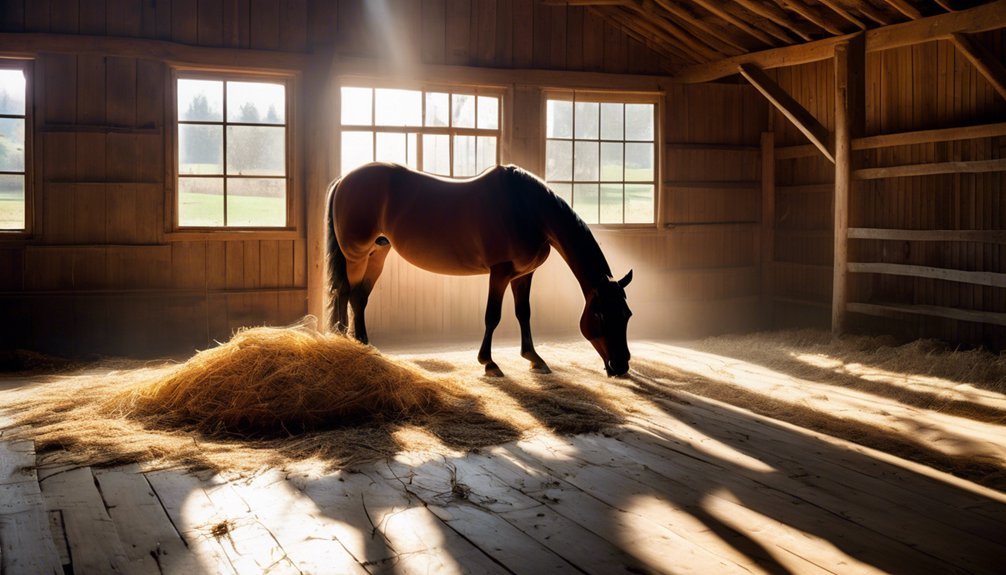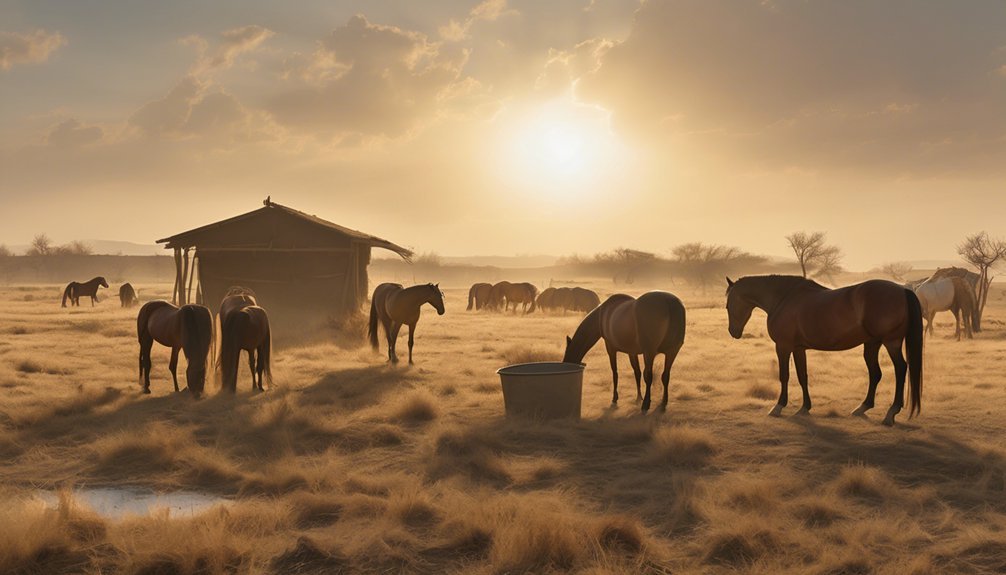
Preventing choke in horses requires a keen understanding of their feeding habits and environmental factors. By implementing specific techniques, you can significantly reduce the risk of this serious condition. Consider how feed type, meal size, and even the feeding location can impact your horse's safety. These elements play a crucial role in promoting better eating behaviors. So, what adjustments can you make to keep your horse healthy and comfortable during meal times?
Key Takeaways
- Implement slow feeding techniques, such as hay nets, to encourage horses to nibble rather than gulp their food.
- Offer smaller, more frequent meals to prevent overeating and reduce the risk of choke.
- Ensure the feed is appropriate for the horse's age, activity level, and health needs to promote safe eating habits.
- Choose high-quality hay with a good mix of fibers to support proper chewing and digestion, reducing choke incidents.
- Maintain a calm and relaxed feeding environment to encourage better eating behaviors and digestion.
Understanding Choke in Horses: Causes and Symptoms

When it comes to understanding choke in horses, recognizing the causes and symptoms is crucial for effective prevention and intervention.
Choke occurs when food or foreign objects obstruct the esophagus, often due to rapid eating, inadequate chewing, or stress. Pay attention to signs like coughing, excessive salivation, or difficulty swallowing. These symptoms can indicate a serious risk to your horse's digestive health.
To ensure choke prevention, consider feeding your horse smaller, more frequent meals and providing forage that encourages slower eating. Monitor your horse's behavior during feeding times, as stress can exacerbate the issue.
Choosing the Right Feed for Your Horse
Choosing the right feed for your horse is essential for maintaining optimal health and preventing issues like choke.
Start by identifying suitable feed types that align with your horse's age, activity level, and health requirements. A combination of grains, pellets, and forages can help achieve a proper nutritional balance.
Look for feeds high in digestible fiber, as this promotes healthy chewing and reduces the risk of choke. Additionally, avoid large, hard chunks or overly dry feed, which can easily cause blockages.
Always introduce new feeds gradually to allow your horse's digestive system to adjust.
The Importance of Hay Quality and Type

While you may focus on the type of feed your horse consumes, the quality and type of hay you provide are equally crucial for preventing choke. Different hay types can affect your horse's ability to chew and digest properly, which directly impacts their risk of choke.
| Hay Type | Storage Method |
|---|---|
| Timothy Hay | Store in a dry, cool place to prevent mold |
| Alfalfa Hay | Keep in a well-ventilated area to maintain freshness |
| Orchard Grass | Use airtight containers to avoid moisture |
Ensure you choose high-quality hay, free from mold and dust, and store it correctly to maintain its integrity. This attention to hay quality and storage will help support your horse's overall health and reduce the risk of choking incidents.
Hydration: Keeping Your Horse Well-Watered
Providing high-quality hay is only part of the equation for maintaining your horse's health; ensuring adequate hydration is equally important. A well-planned hydration schedule can significantly reduce the risk of choke.
Make sure your horse has access to clean, fresh water from varied water sources. Consider these aspects for optimal hydration:
- Clean buckets and troughs to prevent contamination.
- Consistent water availability, especially during hot weather.
- Electrolyte supplementation after intense workouts.
- Monitoring water intake to ensure your horse drinks enough.
Feeding Practices to Minimize Risk

To effectively minimize the risk of choke in horses, it's crucial to adopt feeding practices that prioritize safety and digestion.
Implementing slow feeding techniques can significantly reduce the chances of your horse gulping down feed too quickly. Utilize hay nets or slow feeder buckets that encourage your horse to nibble rather than inhale their food.
Additionally, practicing portion control is vital; avoid overloading feed bins and instead offer smaller, more frequent meals throughout the day. This approach not only aids digestion but also promotes a more relaxed eating environment.
Lastly, always ensure that the feed is appropriate for your horse's age and health, as this plays a key role in preventing potential choke incidents.
Monitoring Your Horse's Eating Habits
Monitoring your horse's eating habits is essential for preventing choke and ensuring overall health. By observing their eating pace and feed preferences, you can identify potential issues before they escalate.
Here are some key aspects to watch for:
- Feeding location: Ensure your horse eats in a quiet, stress-free area.
- Meal duration: Take note if your horse is eating too quickly or taking breaks.
- Preference changes: Recognize any shifts in their enthusiasm for certain feeds.
- Water intake: Monitor their hydration, as it aids in digestion.
Signs of Choke and When to Call a Veterinarian

Even with careful monitoring of your horse's eating habits, choke can still occur. You should stay vigilant for signs like excessive salivation, coughing, or difficulty swallowing.
Your horse may also show signs of distress, such as pawing or pacing, and you might notice an unusual posture, like stretching their neck. If you observe these symptoms, it's crucial to act swiftly.
Implementing choke prevention strategies helps, but when you notice these signs, don't hesitate to call a veterinarian. Quick emergency response is vital, as untreated choke can lead to serious complications.
Frequently Asked Questions
Can Stress Contribute to a Horse's Risk of Choke?
Yes, stress factors can significantly increase a horse's risk of choke. By ensuring a calm feeding environment, you help your horse eat more comfortably, reducing anxiety and promoting safer eating habits that minimize the chances of choking.
Are There Specific Breeds More Prone to Choke?
Imagine your horse struggling, displaying choke symptoms—certain breeds, like Thoroughbreds and Arabians, show heightened breed susceptibility. Understanding these tendencies helps you monitor and manage their feeding habits, ensuring a healthier, happier equine companion.
How Does Dental Health Affect Choking in Horses?
Dental health significantly impacts choking in horses. Regular dental examinations ensure your horse maintains proper chewing efficiency, reducing the risk of food particles becoming lodged in the esophagus, which can lead to choking incidents.
Can Supplements Prevent Choke Incidents?
Think of supplements as safety nets for your horse's feeding practices. Certain supplement types may help reduce choke risk by promoting better digestion and hydration, but they're not a substitute for proper feeding techniques and dental care.
Is There a Specific Feeding Schedule to Follow?
To establish a specific feeding schedule, ensure consistent feeding times and practice portion control. This routine helps your horse digest properly, reducing the risk of choke and promoting overall digestive health and well-being.
Conclusion
To keep your horse safe from choke, remember that prevention is key. By choosing the right feed, ensuring high-quality hay, and adopting mindful feeding practices, you can help your horse nibble rather than gulp. Hydration is just as crucial, so keep fresh water available at all times. As you monitor their eating habits, you'll foster a healthier, happier horse. Ultimately, a little diligence today can save you a world of trouble tomorrow—after all, an ounce of prevention is worth a pound of cure.





